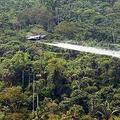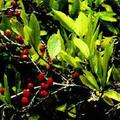 有鑑於哥倫比亞政府在邊境噴灑農藥,在殺死古柯樹的同時卻也危及厄瓜多邊境居民、家畜、農田以及脆弱又生態多樣的雨林地區。為了讓哥國禁止或限制使用抗古柯噴劑,厄瓜多政府於3月31日向國際法庭提出訴訟。
有鑑於哥倫比亞政府在邊境噴灑農藥,在殺死古柯樹的同時卻也危及厄瓜多邊境居民、家畜、農田以及脆弱又生態多樣的雨林地區。為了讓哥國禁止或限制使用抗古柯噴劑,厄瓜多政府於3月31日向國際法庭提出訴訟。
在訴訟國際法庭仲裁之前,厄瓜多已和這個北方鄰國進行長達7年的交涉,卻遲遲未有進展,未能說服哥國沿著雙方相鄰的國界設置一個長約10公里的噴劑禁區。
厄瓜多方面指出,化學噴劑已對人民造成危害、並毒化農田,且在生物型態相對敏感的地區造成損傷。不過,預料哥倫比亞則會以「違法古柯田是提供古柯鹼原料的來源,在空中噴灑熏蒸藥劑是反毒戰爭中關鍵的一環」作為抗辯理由。
厄瓜多外交部長沙瓦多(María Isabel Salvador)於首都基多宣布此訴訟案的記者會上表示,「有鑒於過去在古柯田噴灑熏蒸藥物帶來的危害,總統柯利亞(Rafael Correa)於2007年即成立了由本國傑出的科學家所組成的厄瓜多科學委員會。
「該委員會的實驗結果有了重要的發展,不可否認的,哥倫比亞的撒藥行動,危害了本國的人民與環境。無庸置疑,哥倫比亞政府的行動不但嚴重傷害到厄瓜多政府的主權,且違背國際法最基本的原則——禁止一國對於其鄰國的人民、土地與財富造成損傷。」沙瓦多如此表示。
厄瓜多在訴訟文件中明確指出,哥國自2000年開始使用噴劑,但一直拒絕採取任何相關因應措施。哥國裝載有農藥噴劑之飛機與直升機,反而在起飛、或有時直接飛越邊界時,釋放出消滅各種植物的化學物質。
 這些噴劑飄向厄瓜多國境,當地村民呈報,皮膚上出現霧狀沉澱物。居住在厄瓜多邊境社區的居民,大多數為自給自足的貧苦農民,或者是種植少量現金作物的農民。他們的皮膚發癢起疹且受損、眼睛有灼熱感、噁心、頭暈、併發呼吸道疾病以及腸道流血等。部分農民並因而死亡。
這些噴劑飄向厄瓜多國境,當地村民呈報,皮膚上出現霧狀沉澱物。居住在厄瓜多邊境社區的居民,大多數為自給自足的貧苦農民,或者是種植少量現金作物的農民。他們的皮膚發癢起疹且受損、眼睛有灼熱感、噁心、頭暈、併發呼吸道疾病以及腸道流血等。部分農民並因而死亡。
厄瓜多方面指出,此類噴劑已對家畜與作物造成損傷,迫使村民放棄所養殖的動植物;同時,也危及生物高度多樣化的生態敏感地區。 幾乎有1/3土地作為保護區或公園用地的厄瓜多,被認為是全球生物最高度多樣的國家。
哥倫比亞境內為全球古柯鹼主要產地,美國因此自2000年以來,持續資助哥倫比亞地區古柯作物的氣體噴劑。據美國國務院於2007年3月公布的「國際毒品管制策略報告」(International Narcotics Control Strategy Report),哥倫比亞警政署轄下的反毒品理事會,為減少非法古柯鹼與大麻作物,2006年噴灑的古柯噴劑約17萬1613公頃。
The government of Ecuador today filed suit at the International Court of Justice against the government of Colombia, in an effort to stop or restrict aerial anti-coca spraying that has allegedly sickened people on the Ecuadorean side of the border and harmed livestock, farmland, and sensitive, ecologically diverse rainforest areas.
The lawsuit follows seven years of persistent but unsuccessful diplomatic efforts on Ecuador's part to convince its neighbor to the north to establish a 10 kilometer (six mile) no-spray zone along their shared border.
Colombia is expected to argue that the aerial fumigation of illegal coca farms, which provide the raw material for cocaine production, is a linchpin of the war on drugs. Ecuador claims that the chemical sprays have sickened its people, poisoned farmland and damaged ecologically sensitive areas.
At a press conference in Quito announcing the lawsuit, Ecuadorean Foreign Minister María Isabel Salvador said, "With the purpose of establishing the existence and dimensions of the afflictions suffered by Ecuador as a result of these and past fumigations, last year President Rafael Correa created the Ecuadorian Scientific Commission, comprised of eminent scientists from our country.
"The results of the commission's work have been crucial to reaching the irrefutable conclusion that Colombian aerial fumigations have had noxious effects on our people and our environment," she said.
"There is no doubt that the fumigations conducted by the government of Colombia constitute a grave violation of the sovereignty of Ecuador and of the most basic principles of international law," she said, "which prohibits a state from causing harm to the population, land and well-being of a neighboring state."
Since spraying began in 2000, Colombia has refused to consider such measures, the lawsuit asserts. Instead, its planes and helicopters loaded with herbicide have flown right up to and sometimes directly over the border, releasing chemicals designed to eradicate all forms of plant life.
The spray has drifted to the Ecuadorean side, where villagers have reported feeling the mist settle on their skin. People in Ecuadorean border communities, many of them poor subsistence farmers or those raising small cash crops, have suffered skin lesions and rashes, burning eyes, nausea, dizziness, respiratory problems, and intestinal bleeding. Some have died.
Ecuador alleges that the spraying has killed livestock and crops, forcing the abandonment of villages, while harming ecologically sensitive areas of high biodiversity. Nearly one third of the country's territory is protected or park land, and Ecuador is estimated to have the highest average biological diversity of any nation on Earth.
Since 2000, the United States has been financing the aerial spraying of coca crops in Colombia, which is the world's leading producer. In 2006, the Colombian National Police's Anti-Narcotics Directorate sprayed 171,613 hectares of illegally grown coca and opium poppy, according to a March 2007 International Narcotics Control Strategy Report released by the U.S. State Department.
全文及圖片詳見:ENS



